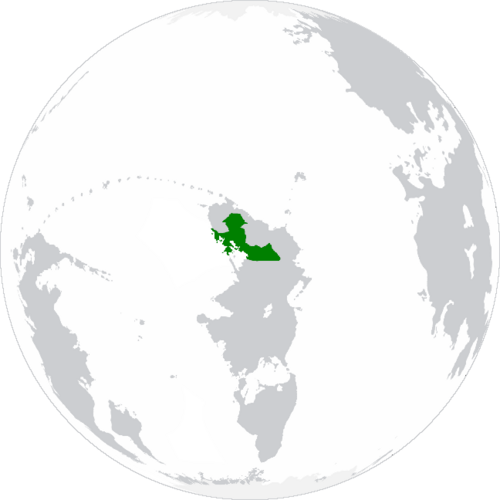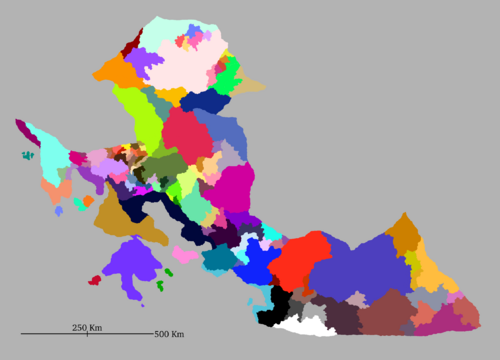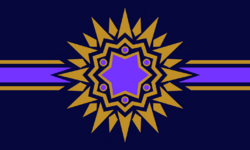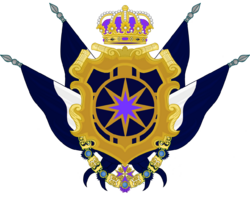Kustannuksan Empire (Pacifica)
Kustannuksan Empire Kustannuksalainen Imperiumi (Kustannan) कुस्तन्नुक्सन साम्राज्य (Vedangari) | |
|---|---|
Motto: "Suuruus seuraa Pohjoistä Tähteä" "महत्त्वं उत्तरतारकस्य अनुसरणं करोति" "Greatness follows the Northern Star" | |
Anthem: "A Star shines over the Seas" Royal anthem: "A beacon of light to follow" | |
 Territories of the Kustannuksan Empire. | |
 | |
| Location | Northern Bailtem. |
| Capital and | Pohjoinen 2°25'N 25°69'E |
| Official languages | Kustannan Vedangari |
| Ethnic groups | Sjöfolk Jasiiradaha Pahaadache Nehirdoğu Nycimbrians Andrendians |
| Demonym(s) | Kustannuksan |
| Government | Federal Parliamentary Constitutional Monarchy |
• Hallits (Emperor/Empress) | Astrid Madeleine Violetähden II |
• Imperial Chancellor | Emil Otto Michelsen |
• President of the Imperial Senate | Carlo Adamo De Courantis |
| Legislature | Imperial Parliament |
| Imperial Senate | |
| Imperial Chamber Of Deputies | |
| Establishment | |
| Area | |
• | 783,286 km2 (302,428 sq mi) |
| Population | |
• 2024 estimate | 159.007.058 |
• Density | 203/km2 (525.8/sq mi) |
| GDP (nominal) | estimate |
• Total | 6,015,000,000,000 |
• Per capita | 56,788 |
| Gini | 21.6 low |
| HDI | 0.968 very high |
| Currency | Kustannuksan Tähtirah (TAH) |
| Time zone | UTC+2 (UTC) |
| Date format | dd/mm/yyyy CE |
| Driving side | right |
| Calling code | +150 |
| World Forum Code | KU |
| Internet TLD | .ku |
The Kustannuksan Empire (Kustannan: Kustannuksalainen Imperiumi; Vedangari: कुस्तन्नुक्सन साम्राज्य), also referred to as simply Kustannuksa, is a sovereign confederation of states located in the north of Bailtem, bordered by the Dacian Federation, New Altnavia and Amberholde in the north, Andrendia in the east, Arnchow in the south, and the South Pacific Ocean to the west. Kustannuksa's territory is mainly characterized by expansive plains in the north and south-east, and large mountain chains concentrating in the west and center. Kustannuksa has a mostly tropical rainforest climate, although other tropical climates can be found in the south, as well as oceanic and tundra climates which can be found at higher altitudes in the mountain chains.
The Empire was founded on 23rd of March 1524 with the signing of the Kolmen Osavaltion Sopimus (usually abbreviated as KOS; literally the "Tri-State Agreement"), when the Timandak Confederation, the Kingdom of Kultansuuni and the Merenkul Monarchate joined the new federal state. Even after the formal dissolution of these nations, their previous ruling classes, governments and aristocracies still continued to hold notable power, as the federal nature of the Empire continued to give them plenty of autonomy; some even became more powerful, as they were appointed by the governments of their states as members of the new Imperial Senate. Most notably, the Violetähden Dinasty gained considerable amounts of power in the new government thanks to election of Emine Hürrem Violetähden as Hallits (Empress) of the Kustannuksan Empire.
Etymology
Kustannuksa derives from the Old Meruken word "Kustannuksia", which can be best translated as "costs". However, while the etymology of the word is rather certain, it's meaning isn't: currently available records do not state why it was chosen as the name for the new Empire in the KOS, nor do they contain any hints that might lead scholars to formulate any truly meaningful hypothesis.
History
Pre History
Neolithic
Bronze Age
Iron Age
Maritime Antiquity
Middle Ages
Early Modern Period
Foundation of the Empire
Years of Establishment
Early Expansion
Years of the Golden March
Late Modern Period
Contemporary History
Geography
Politics
Government
Administrative Divisions
Law
Foreign Relations
Military
Economy
Tourism
Manufacturing
International Trade
Natural Resources
Demographics
Population
Religion
Language
Education
Health
Largest Cities
Ethnic Groups
Culture
The Kustannuksan Empire has, since it's very foundation, been known for it's multiculturalism, policies of racial equality, acceptance of LGBT peoples, gender equality, religious acceptance and ideological tolerance. These values were inherited by the Empire from the three founding nations that preceded it, but were also shared in one form or another by many of the subsequently conquered nations that surrounded them. These cultural values were then codified into law as part of the first Imperial Constitution of 1524, which is therefore credited as being one of the oldest human rights documents in history.
These values can also be seen in the Imperial Government itself, where the highest positions in the Empire (including the Hallits and Imperial Chancellor) were covered by men, women and non-binary individuals of different races and ethnicities, many of whom were in non-heterosexual marriages and relationships.

